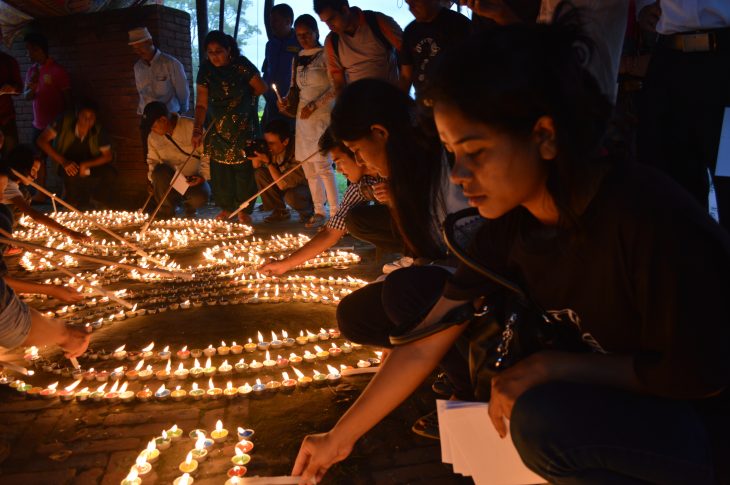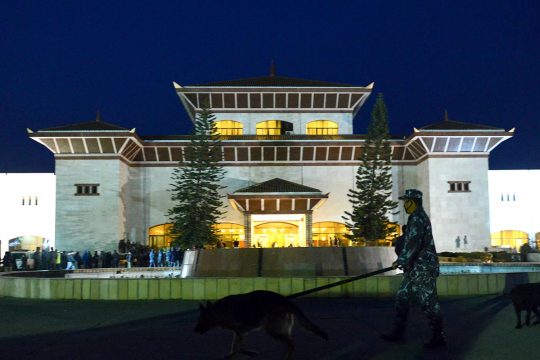The recently established Truth and Reconciliation Commission (TRC) and Commission for Investigation on Enforced Disappeared Persons (CIEDP) have limited their activities to government territories, meeting with line ministries and politicians to win their trust. The commissions have squandered a significant amount of time cozying up to those in power, including alleged perpetrators, which has given the victims reason to be more suspicious than assured of justice. The two commissions that were set up to heal the wounds from the conflict are not talking to their important constituency – the victims and their associations. A shift is needed to ensure that the approach of the commissions is victim-centric ensuring justice for those that suffered the most during the conflict.
TRC officials met and regularly consulted with home minister, who tabled the Disruptive Activities Ordinance (TADO), which later turned into Terrorism and Disruptive Acts (TADA) during the conflict, former prime ministers and political heads who withdrew hundreds of criminal cases of rights violations when at power. They have no position on Nepal army chief’s press note (10 Dec 2014) that arrogantly claims itself to be above law of the nation that no institutions or bodies have the right to investigate any personnel or their institution. The TRC has been continuously advocating for the return of Colonel Kumar Lama, an alleged perpetrator who is currently in court trial in the UK. However, the commission has never cared to consult with victims of torture and disappearance about their concerns. It has never made a statement to criminalise torture and disappearance and amend the problematic provision in the act.

Additionally, the victims of the districts were appalled by the way commissioners presented themselves in their recent district visits. Platform members have reported a general lack of decency and knowledge of conflict cases. The role of commissioners and their behavior matter a lot in the course of action; in about two dozen districts, the responsible TRC commissioners treated platform members poorly, which has compelled the victims to question the commissioners’ credibility and the commissions themselves. When the commissioners do not listen to victims, they expose themselves as politically biased; effectively dealing with the past becomes impossible. In Rolpa, a highly affected district during the conflict, a CVCP and local peace committee member said, “I was eager to see the commissioner in the district but when I did meet them, I was heavily disappointed. They acted as a divisive player instead of facilitator. How can they win the confidence of the victims?” CVCP members from other districts have submitted similar reports. If such interactions continue during the testimony collection phase and potential public hearings, many victims may not be comfortable participating. The trust and confidence of victims have significant value to the process, and the commissions should respect and cultivate this. It is clear that the commissioners still need serious orientation and training to become victim-friendly. Ultimately a commission process devoid of proper testimony from victims will be incomplete. Up to the 6 month period, the commissions failed to demonstrate their real will to address and create a victim centered approach. They themselves drafted a regulations without consultation with victims, rather they asked for comments in a readymade draft that not only insulted victims but also not adopting the transitional justice principles, UN guidelines, EU framework on transitional justice, and the draft has ignored the recent supreme court verdict to respect and reflecting in the current regulations.
Without criminalizing disappearances and torture in line with the (1 June, 2007, 2 January 2014, and 26 February 2015) Supreme Court verdicts, there are practical challenges for the commissions to gain victims’ trust. There will also be challenges in how the commissions reassure victims and other agencies working in this area and how they share information already gathered such as that from the National Human Rights Commission’s investigations. There does not seem to be any coordination ongoing to date; NHRC is not being proactive in implementing its monitoring mandate for the commissions, and is no meaning to monitor once the commissions’ work is done.
A majority of victims of human rights violations from the conflict still have no idea about the commission’s objectives, missions and the commissioner’s responsibility to address the key concerns of the victims’ community. Beyond their limited legal mandate, the commissions by operating in good faith, can create a trustworthy environment, assuming that victims and survivors are able to tell the truth without feeling re-traumatized. Prior to the formation of the commissions, there was a long debate within Nepal’s transitional justice community with a focus on questions of legitimacy for a credible procedure. However, in the aftermath of commission formation in early February 2015, the Conflict Victims' Common Platform (CVCP) has clearly established itself as a national victims watchdog, adopting a critical engagement policy and empowering thousands of victims in the field to maximize the opportunity for their truth, justice and reparation scheme through the commission process. The Platform’s district focal persons in 73 districts along at the platform regional network mobilize their members to update on the commissions’ works and advocate for their concerns. The platform has already engaged with victims informally through mobilization throughout the country, linking victims in the transitional justice, social harmony discussions, self-help approach, and local memory initiatives. The victims have organized, developed their demands and platform, and present themselves an unified front.
To address these issues the CVCP officially requested to meet both commissions on 27th July in Kathmandu. The purpose of the meeting was to convey victim’s position of critical engagement with the Commissions and their key demands after the CVCP’s nationwide consultation, and to listen to both commissions concerning their vision of their role. Victims’ representatives from across the country have raised genuine concerns over their participation, the commissions’ objectives and mission statements, the budgeting and staffing process, the definition of a victim-centric approach and the outreach policy, data collection, protection of evidence and archiving policy, witness and victims protection and their coordination mechanism between the two commissions, publication of report and the role of victims in the whole process.
The positive fact is that the dialogue has started between the victims platform and the commissions, but the platform feels that the commissions are not creating such environment to engage, rather the commissions look victim groups as threat, which may discontinue victims’ critical engagement and should go for informal truth seeking process with the victims. the CVCP still demands the creation a constructive environment for their engagement when the commissions play a role to complement to criminal justice, as these commissions are not judicial inquiries. They should clarify their limitation to disclose the truth, establish the facts on causes of conflict and recommend fair reparations measures. Still, there is no clear picture that when they begin their investigation, the methodology, collection of evidence, processing and producing a strong report, so far there is a little hope that both the commissions can accomplish their mandated tasks within the two years deadline.
In the Nepal context, it seems unlikely that both commissions can address the existing challenges and fill the gaps in between victims and the commissions, and the Government. To date, not only the transitional justice process, but also the constitution drafting process has fully ignored victims concerns; no provisions in the new draft on retrospective laws, or transformative justice to the conflict victims. As a state, Nepal has failed to recognising victims right to truth and reparation, against victims expectation and the international norms of transitional justice. To learn from the victims collective campaign, both the commissions should begin a consultative approach to let victims participate in the process from regulations draft to every step of implementation phase.
There are serious flaws in the Act: without amendment, the commissions cannot effectively deliver. The chair of the disappearance commission publicly spoke in the programme organized by the families of disappeared and honestly said that amendment in the current commission act is a must: The commission cannot amend the act rather following the act. Victims and the Commissions must work together and jointly create pressure on government so that both errors in the laws and the Supreme Court verdict can be amended to drive a victim-centric approach. Coordination is a must and collaboration is needed with various stakeholders to ensure the success of both commissions. Above all, the participation of victims must play a significant role in the commission process; both commissions should identify the role of victims as engaged participants and key partners during the commissions’ life and beyond to implement their recommendations for the future course of justice in Nepal.






